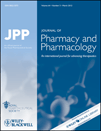Effect of low-protein diet on anthracycline pharmacokinetics and cardiotoxicity
Abstract
Objectives Anthracyclines are broad spectrum anticancer drugs with dose-dependent cardiotoxicity. Protein malnutrition commonly occurs in cancer patients and is considered a risk factor for development of cardiotoxicity. This study was designed to assess the modulatory effect of protein malnutrition on the pharmacokinetics and drug disposition properties of a single dose of doxorubicin and epirubicin and how these possible changes will affect the degree of cardiotoxicity of these drugs.
Methods A single interperitoneal dose of 15 mg/kg of either doxorubicin or epirubicin was injected into rats fed with either normal protein diet or low-protein diet. The plasma concentration–time profiles of doxorubicin and epirubicin and their concentrations in different tissues were determined. Serum creatine kinase level was determined at different time intervals and histopathological examination of heart tissue was carried out.
Key findings Protein malnutrition significantly altered the pharmacokinetics of doxorubicin and epirubicin, with a significant decrease in their elimination, and prolonged the exposure of the heart to these drugs. Histopathological examination and serum creatine kinase measurements supported the role of protein malnutrition in enhancement of anthracycline cardiotoxicity.
Conclusions If similar alteration in anthracyclines' pharmacokinetics occurs in malnourished cancer patients, protein malnutrition will be a risk factor for development of anthracycline cardiotoxicity and dose adjustment will be required in nutritionally deprived patients.




